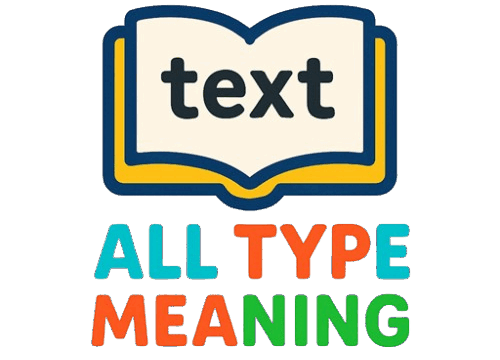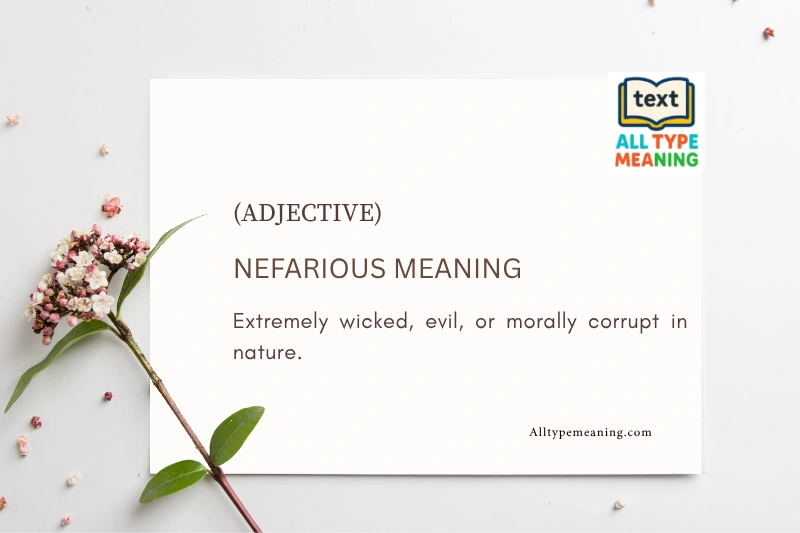welcome to All Type Meaning !The Nefarious meaning refers to something wicked, evil, or morally wrong — a word that instantly adds drama and intensity to any sentence. Whether it’s describing a villain in a story, a corrupt act in real life, or just teasing a friend for their “nefarious plans,” this word packs a punch!
Understanding such powerful vocabulary not only makes your communication richer but also helps students, professionals, and language lovers express complex emotions with precision. In this article, we’ll break down the full meaning of “nefarious,” explore its origin, and show you how to use it confidently in everyday conversations. Let’s dive in!
Quick Stats: Nefarious at a Glance
| Aspect | Details |
|---|---|
| Word Type | Adjective |
| Origin | Latin word “nefarius” (wicked, abominable) |
| Syllables | 4 syllables (ne-far-i-ous) |
| First Known Use | Early 17th century (around 1600s) |
| Difficulty Level | Advanced vocabulary |
| Common Usage | Literature, legal contexts, formal writing |
| Synonyms Count | 15+ common alternatives |
| Pronunciation | /nɪˈfeəriəs/ (nih-FAIR-ee-us) |
What Does Nefarious Mean? Understanding the Definition
Let’s start with the basics. The nefarious definition is straightforward yet impactful:
Nefarious (adjective): Extremely wicked, villainous, or criminal in nature. It describes actions, plans, or people that are morally wrong and often illegal.
When we say someone or something is nefarious, we’re not just calling them “bad”—we’re emphasizing that their actions are deliberately evil, harmful, and often done with malicious intent. 😈
Breaking Down the Nefarious Meaning
The word “nefarious” carries several important nuances:
- Deliberate Evil: Unlike accidental wrongdoing, nefarious acts are intentional and planned
- Serious Harm: Nefarious activities typically cause significant damage to others
- Moral Corruption: The word implies a deep-seated wickedness or lack of moral compass
- Often Criminal: Nefarious deeds frequently involve illegal activities or schemes
Think of nefarious as the vocabulary word you’d use to describe a villain in a movie who’s plotting to take over the world or a criminal mastermind planning an elaborate heist. It’s not for small mistakes or minor mischief—it’s reserved for genuinely evil intentions and actions! 🎭
Origin and History: Where Did “Nefarious” Come From?
Understanding a word’s origin helps us appreciate its true meaning. The journey of “nefarious” is quite fascinating! 📚
Etymology Breakdown:
- Latin Root: The word comes from the Latin “nefarius,” which combines “ne-” (not) and “fas” (divine law)
- Original Meaning: In ancient Rome, “nefarius” literally meant “against divine law” or “impious”
- Evolution: Over centuries, the word evolved to mean wicked or villainous in general usage
The Romans used this term to describe acts that violated sacred laws or religious principles. Imagine someone breaking the most fundamental rules of society—that’s the level of wrongdoing “nefarius” represented. Today, while we’ve moved away from the religious connotation, the sense of profound wickedness remains! ⚖️
Historical Timeline:
- 1600s: First appeared in English literature
- 1700s-1800s: Commonly used in legal and religious texts
- Modern Era: Widely used in journalism, literature, and everyday conversation
How to Use “Nefarious” Correctly: Examples and Contexts
Now that we understand what does Nefarious meaning, let’s explore how to use it properly in sentences. This is where the word truly comes to life! ✨
Everyday Examples
- Crime and Law:
- “The detective uncovered the gang’s nefarious plot to rob the city’s largest bank.”
- “His nefarious activities finally caught up with him when police found evidence.”
- Literature and Storytelling:
- “The nefarious villain laughed as he revealed his master plan to the captured hero.”
- “In the novel, the corporation’s nefarious schemes destroyed entire communities.”
- Politics and Business:
- “Journalists exposed the politician’s nefarious dealings with foreign agents.”
- “The company’s nefarious practices included exploiting workers and evading taxes.”
- Historical Context:
- “History books document the dictator’s nefarious reign of terror.”
- “The spy’s nefarious mission was to steal classified government documents.”
- Casual Conversation (though less common):
- “My brother had a nefarious plan to eat all the cookies before dinner!” (Note: This is somewhat humorous/exaggerated usage)
The Adverb Form: Nefariously
You might also encounter “nefariously”—the adverb form of nefarious. This describes how something is done in a wicked manner.
Examples:
- “He nefariously manipulated the evidence to frame an innocent person.”
- “The hackers nefariously accessed private customer data.”
- “She smiled nefariously as she prepared her revenge.”
Common Mistake Alert! ⚠️
Some people mistakenly write “navarious” instead of “nefarious.” This is incorrect! There’s no such word as “navarious” in English. The correct spelling is always N-E-F-A-R-I-O-U-S. Remember: “ne-FAR-ious” sounds like “far” in the middle! 🎯
Synonyms and Antonyms:
Building a strong vocabulary means understanding related words. Let’s explore alternatives to “nefarious” and their opposites! 📝
Synonyms (Words with Similar Meanings)
- Villainous – Characteristic of a villain; wicked
- Wicked – Evil or morally wrong
- Heinous – Utterly horrible or shocking
- Malevolent – Having or showing ill will
- Sinister – Suggesting evil or harm
- Diabolical – Devilishly wicked or cruel
- Malicious – Intending to do harm
- Iniquitous – Grossly unfair and morally wrong
- Vile – Extremely unpleasant or morally bad
- Corrupt – Dishonest or immoral
- Depraved – Morally corrupt or perverted
- Evil – Profoundly immoral and wicked
- Criminal – Relating to or guilty of crime
- Immoral – Not conforming to accepted standards of morality
- Atrocious – Horrifyingly wicked
Quick Comparison:
- Use “nefarious” for planned, deliberate evil acts
- Use “wicked” for general moral badness
- Use “heinous” for especially shocking or horrific acts
- Use “sinister” for threatening or ominous evil
Antonyms (Words with Opposite Meanings)
- Virtuous – Having high moral standards
- Noble – Having fine personal qualities
- Righteous – Morally right or justifiable
- Honorable – Bringing or deserving honor
- Ethical – Morally good or correct
- Pure – Free from immorality
- Innocent – Not guilty of wrongdoing
- Benevolent – Well-meaning and kindly
- Moral – Concerned with principles of right and wrong
- Good – Having the required qualities; virtuous
Why Learning “Nefarious” Matters: Practical Benefits
You might wonder, “Why should I bother learning such a fancy word?” Great question! Here are compelling reasons why “nefarious” deserves a spot in your vocabulary arsenal: 💪
1. Academic Excellence
- Appears frequently in literature, especially classic novels
- Common in standardized tests (SAT, GRE, TOEFL)
- Enhances essay writing and makes arguments more persuasive
- Shows sophisticated language skills to teachers and professors
2. Professional Communication
- Useful in legal, journalistic, and business writing
- Conveys precise meaning in formal reports
- Impresses colleagues and superiors with advanced vocabulary
- Essential for understanding news articles and professional documents
3. Better Comprehension
- Helps you understand movies, books, and TV shows better
- Enables you to follow complex news stories about crime and corruption
- Improves your ability to analyze characters in literature
- Makes reading more enjoyable when you understand every word
4. Effective Communication
- Allows you to express ideas more precisely than using generic words like “bad”
- Adds color and impact to your speaking and writing
- Helps you describe serious situations with appropriate gravity
- Makes your communication more memorable and persuasive
5. Cultural Literacy
- “Nefarious” appears in countless movies, books, and shows
- Understanding it helps you appreciate popular culture references
- Connects you to centuries of English literature and history
- Makes you a more informed global citizen
Conclusion:
The article on Nefarious Meaning by All Type Meaning explains that “nefarious” means extremely wicked, evil, or immoral — used for describing villains, criminal acts, or deliberate wrongdoing. It traces the word’s Latin origin “nefarius” (against divine law) and explains how it evolved into modern English. The article includes usage examples, synonyms and antonyms, and tips on how to use it in speech and writing. It also highlights why learning such advanced vocabulary enhances communication, academic writing, and cultural understanding. Explore our ultimate guide to the intriguing meaning of Curfuffle Meaning.
Frequently Asked Questions
1. What is the exact nefarious meaning in simple words?
In the simplest terms, nefarious means extremely evil or wicked. If someone’s actions are nefarious, they’re doing something very bad, usually on purpose, and often illegal. Think of a movie villain planning something terrible—that’s nefarious! It’s stronger than just “bad” or “mean”; it implies serious wrongdoing with harmful intentions. 🦹♂️
2. How do you pronounce “nefarious” correctly?
The correct pronunciation is nih-FAIR-ee-us (/nɪˈfeəriəs/). Break it down into four syllables: “ne” (like “knee” but shorter) + “FAR” (like the word “far”) + “ee” (like the letter “e”) + “us” (like “us”). The emphasis is on the second syllable: “FAIR.” Practice saying it slowly at first, then speed up as you get comfortable! 🗣️
3. Can “nefarious” be used to describe people, or only actions?
Both! You can use nefarious to describe people (nefarious villain, nefarious criminal) or their actions (nefarious plot, nefarious scheme). When describing a person as nefarious, you’re saying their character or behavior is wicked. When describing actions, you’re saying the deed itself is evil. Both uses are grammatically correct and common! 👥
4. Is there any difference between “nefarious” and “notorious”?
Yes, there’s a big difference! Nefarious means evil or wicked—it describes the moral quality of something. Notorious means famous for something bad—it describes being well-known. Someone can be notorious (famous) without being nefarious (evil), or they can be both. For example: “The notorious bank robber was known for his nefarious schemes.” Notorious = famous; nefarious = evil. 🎭
5. What are some common mistakes people make with the word “nefarious”?
The most common mistakes include:
- Misspelling: Writing “navarious” or “neferious” instead of “nefarious”
- Overuse: Using it for minor bad behavior (save it for serious wickedness!)
- Wrong context: Using it in casual, playful situations where it sounds too dramatic
- Pronunciation: Saying “neh-FAR-ee-ous” (four syllables) instead of rushing through it
Remember, nefarious is a strong word for serious situations, not everyday mistakes! ⚠️
Discover the new words, slang, and useful language tips with All Type Meaning!📚

